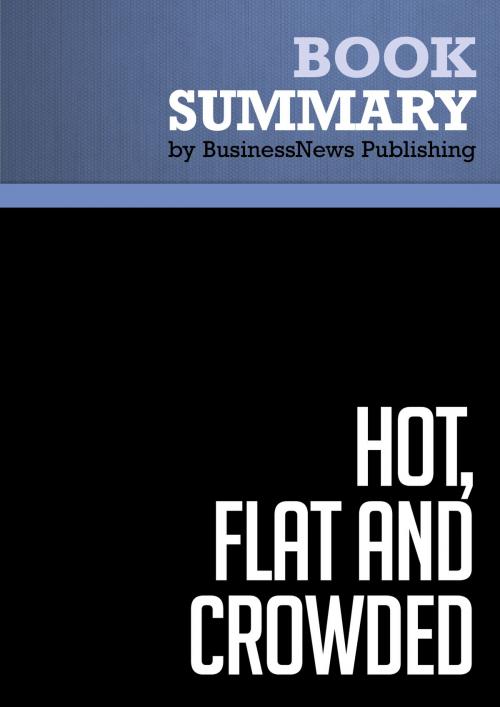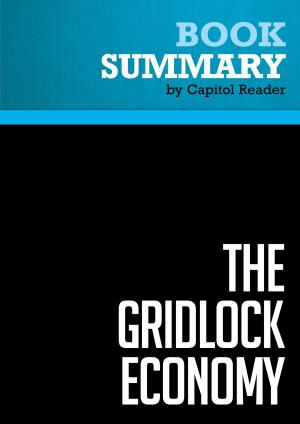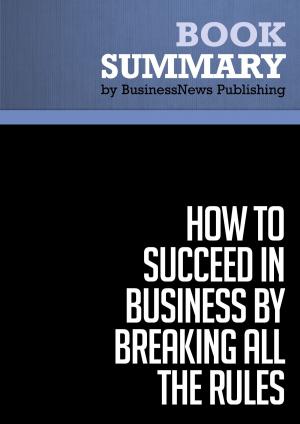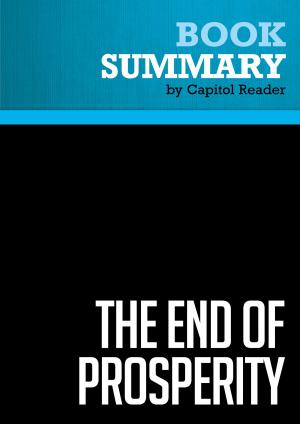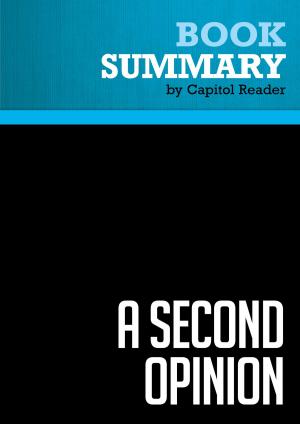Summary: Hot, Flat and Crowded - Thomas Friedman
Business & Finance, Economics, Development & Growth, Management & Leadership, Management| Author: | BusinessNews Publishing | ISBN: | 9782806246660 |
| Publisher: | Must Read Summaries | Publication: | February 15, 2013 |
| Imprint: | Business Book Summaries | Language: | English |
| Author: | BusinessNews Publishing |
| ISBN: | 9782806246660 |
| Publisher: | Must Read Summaries |
| Publication: | February 15, 2013 |
| Imprint: | Business Book Summaries |
| Language: | English |
This work offers a summary of the book “HOT, FLAT AND CROWDED: Why We Need a Green Revolution – and How It Can Renew America” by Thomas Friedman.
Thomas Friedman believes we are at a crossroads of human civilization, which he characterizes in Hot, Flat and Crowded. We are at a nexus of global warming (hot), globalization, which means an affluent middle class wants to enjoy success, even at environmental expense (flat) and population growth (crowded). Green solutions are the only way all three of these issues can be resolved satisfactorily. It’s also a huge commercial opportunity: the replacement of fossil fuels is a golden business opportunity. Friedman believes we need to declare a “code green” to stimulate industry, education and science in pursuit of environmental goals. In short, as Friedman says, “this is not about the whales anymore. It’s about us.”
Hot, Flat and Crowded explains how we got the current situation, and the most effective ways we need to move forward. Environmental awareness needs to be a society norm; there need to be incentives for individuals to build their own mini-arcs, rather than rely on federal measures. He argues convincingly that not taking opportunities now will prove to be both environmentally and economically disastrous: the nation that embraces green technology innovation will be the world superpower for generations to come.
Thomas Friedman believes we are at a crossroads of human civilization, which he characterizes in Hot, Flat and Crowded. We are at a nexus of global warming (hot), globalization, which means an affluent middle class wants to enjoy success, even at environmental expense (flat) and population growth (crowded). Green solutions are the only way all three of these issues can be resolved satisfactorily. It’s also a huge commercial opportunity: the replacement of fossil fuels is a golden business opportunity. Friedman believes we need to declare a “code green” to stimulate industry, education and science in pursuit of environmental goals. In short, as Friedman says, “this is not about the whales anymore. It’s about us.”
Hot, Flat and Crowded explains how we got the current situation, and the most effective ways we need to move forward. Environmental awareness needs to be a society norm; there need to be incentives for individuals to build their own mini-arcs, rather than rely on federal measures. He argues convincingly that not taking opportunities now will prove to be both environmentally and economically disastrous: the nation that embraces green technology innovation will be the world superpower for generations to come.
This work offers a summary of the book “HOT, FLAT AND CROWDED: Why We Need a Green Revolution – and How It Can Renew America” by Thomas Friedman.
Thomas Friedman believes we are at a crossroads of human civilization, which he characterizes in Hot, Flat and Crowded. We are at a nexus of global warming (hot), globalization, which means an affluent middle class wants to enjoy success, even at environmental expense (flat) and population growth (crowded). Green solutions are the only way all three of these issues can be resolved satisfactorily. It’s also a huge commercial opportunity: the replacement of fossil fuels is a golden business opportunity. Friedman believes we need to declare a “code green” to stimulate industry, education and science in pursuit of environmental goals. In short, as Friedman says, “this is not about the whales anymore. It’s about us.”
Hot, Flat and Crowded explains how we got the current situation, and the most effective ways we need to move forward. Environmental awareness needs to be a society norm; there need to be incentives for individuals to build their own mini-arcs, rather than rely on federal measures. He argues convincingly that not taking opportunities now will prove to be both environmentally and economically disastrous: the nation that embraces green technology innovation will be the world superpower for generations to come.
Thomas Friedman believes we are at a crossroads of human civilization, which he characterizes in Hot, Flat and Crowded. We are at a nexus of global warming (hot), globalization, which means an affluent middle class wants to enjoy success, even at environmental expense (flat) and population growth (crowded). Green solutions are the only way all three of these issues can be resolved satisfactorily. It’s also a huge commercial opportunity: the replacement of fossil fuels is a golden business opportunity. Friedman believes we need to declare a “code green” to stimulate industry, education and science in pursuit of environmental goals. In short, as Friedman says, “this is not about the whales anymore. It’s about us.”
Hot, Flat and Crowded explains how we got the current situation, and the most effective ways we need to move forward. Environmental awareness needs to be a society norm; there need to be incentives for individuals to build their own mini-arcs, rather than rely on federal measures. He argues convincingly that not taking opportunities now will prove to be both environmentally and economically disastrous: the nation that embraces green technology innovation will be the world superpower for generations to come.
